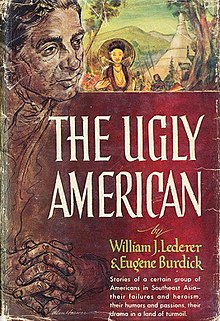The Ugly American

First edition cover
|
|
| Author |
Eugene Burdick William Lederer |
|---|---|
| Country | United States |
| Language | English |
| Genre | Political fiction |
| Set in | Sarkhan |
| Published | 1958 by Norton |
| Media type | |
| Pages | 285 pp |
| OCLC | 287560 |
| 823.914 | |
| LC Class | PS3562.E3 |
The Ugly American is a 1958 political novel by Eugene Burdick and William Lederer which depicts the failures of the U.S. diplomatic corps in Southeast Asia.
The book caused a sensation in diplomatic circles, and had major political implications. The Peace Corps was established during the Kennedy administration partly as a result of the book. It was one of the biggest bestsellers in the country, has been in print continuously since it appeared and is one of the most politically influential novels in all of American literature.
William Lederer was an American author and captain in the U.S. Navy who served as special assistant to the commander in chief of US forces in the Pacific and Asian theater.
Eugene Burdick was an American political scientist, novelist, and non-fiction writer, and served in the Navy during World War II. The two met in the buildup to the War in Vietnam.
The authors were disillusioned with the style and substance of America's diplomatic efforts in Southeast Asia. They sought to demonstrate through their writings their belief that American officials and civilians could make a substantial difference in Southeast Asian politics if they were willing to learn local languages, follow local customs and employ regional military tactics.
The book was very much a product of its times and historical context.
In 1958 the Cold War was in full force, pitting the two geopolitical giants, the United States and the Soviet Union, against each other for military and geopolitical influence and dominance. NATO and the Warsaw Pact divided Europe into two competing visions of the world, with the Western world viewing countries in the Eastern Bloc as behind an Iron Curtain with the failed Hungarian Revolution in 1956 confirming this. The nuclear arms race was underway with the US well ahead initially, but by 1955, the Soviets had exploded a hydrogen bomb and were beginning to catch up, sparking fears of nuclear armageddon. The Soviet launching of Sputnik into orbit in 1957 gave the Soviets a huge technological and propaganda victory and sparked a crisis of confidence in the United States and worries about falling behind technologically and militarily and concerns whether its education system was up to the job of competing with the Soviets. In Asia, the French had left Indochina in 1954 after their defeat at the Battle of Dien Bien Phu and this marked the beginning of U.S. involvement in Vietnam. The U.S. and the Soviets struggled for preeminence in the Third World through proxies in Latin America, Africa, and Asia. In the Middle East, the US feared the spread of Communism starting in Egypt and attempted to secure the region's most populous and politically powerful country for the West by guarantees of funding for construction of the Aswan Dam but it was eventually the Soviets who prevailed. Soviet diplomatic and political successes in the Third World left the West worried about losing one country after another to Communism according to the domino theory evoked by President Dwight D. Eisenhower.
...
Wikipedia
